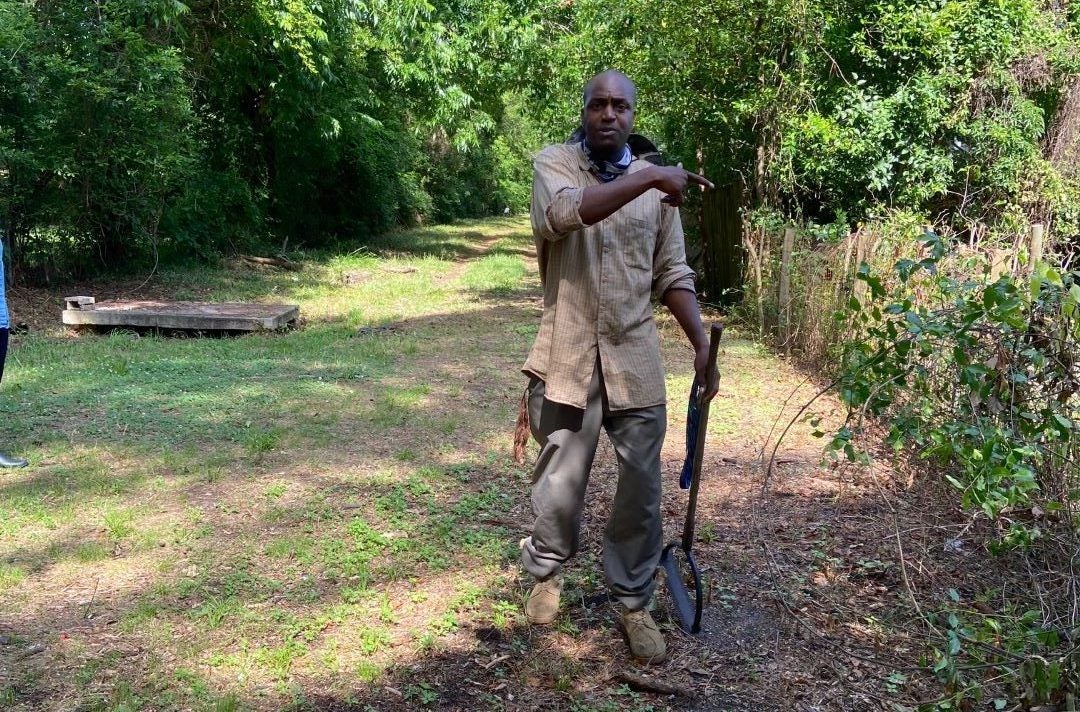After rehabbing one blighted property on Cook Road and turning it into an urban garden and greenspace, Dan Scott of Studio Farmer has recently started a second pilot project in the Glendale subdivision near Olive Road.
“I want to take a bite out of blight,” said Scott, a veteran who has a multi-tiered plan through his non-profit organization for reducing not only blight in the city of Augusta, but minimizing the effects of a food desert, helping create jobs and providing education for area residents.
MORE: Studio Farmer Helps Augusta Grow
When the subdivision was built in the mid-1950s, the half-acre tract at 1717 Cornell Dr. served as an easement. As time passed, the property was abandoned and became an overgrown eyesore to its neighbors, including Scott, whose family home backs up to the lot.
“My grandfather and uncles lived there,” said Scott, who is the current resident.
Through a rarely-used law, Scott obtained the property in the name of his non-profit and added it to the number of farm tracts he has around the city.
It’s been taken off the docket of the city’s blighted properties, he said, and on June 11, he brought together a couple of his partners and laid out his plan for the space to Augusta Commissioner Dennis Williams.
[adrotate banner=”54″]
Scott obtained the deed last month, and the space has been mowed, ready for his plans to take shape.
“We’ve converted it back to farmland. Before it was developed, this was crop land,” he said.
Over the past five years, Scott has done his homework and through his first pilot project and another farm in Hephzibah, he’s learned about the availability of grants through the U.S. Department of Agriculture’s Natural Resources Conservation Service to build high tunnel systems, more commonly known as hoop houses, to extend the growing season.
Scott said on the L-shaped site, he can envision five 700-square-foot hoop houses, which would address what some might call the food desert in the area, a concept Scott refutes. According to a 2012 USDA study, a food desert is an area where people have limited access to a variety of healthy and affordable food.
“We’re not in a food desert,” he said. “It’s a fool’s desert because we’re not educated.”
Education is one of the main things Scott wants to bring to the table. In Scott’s view, teaching people how to create a self-sustaining community is the answer; food boxes are not.
[adrotate banner=”22″]
“No one has taught them,” he said.
And he proposes to do that through this second pilot project.
People can use the resources already available to them. Many people are unaware that they can purchase seeds to start crops with EBT or Supplemental Nutrition Assistance Program benefits.
Scott has enlisted Fred and Anna Griffin of the Ebony Tree Council to create a curriculum, and Kiammie Freeman of Earthly Rooted to find agritourism options for the space.
“He’s very passionate about this, and he needs help,” Freeman said.
Scott further intends to utilize the Workforce Innovation and Opportunity Act to help people secure employment and training.
Williams said he could see the potential for Scott’s program and its multiple benefits.
“I see it as being a positive program,” he said.
He agreed with Scott on the accounts of helping feed people and provide jobs.
“This makes good use of the land,” he said.
[adrotate banner=”19″]
Not only does he see the land as a way to help sustain the community, the property provides other advantages, such as a safe place for the neighborhood children to play. Scott said they have an area to ride bikes and run around off the busy streets.
Scott plans to move quickly with his objectives.
“I’d like to have everything up and going by the beginning of the school year,” he said.
MORE: Urban Farm Program Provides Job Training
His vision doesn’t stop there. It extends beyond the Cornell Drive site. There’s another larger tract in the neighborhood that is in a similar situation. He sees such potential for it.
“These are hubs of gold,” he said.
Find Studio Farmer on Facebook at https://www.facebook.com/Farm726Tract926 and on Instagram @StudioFarmerInc.
Charmain Z. Brackett is the Features Editor for The Augusta Press. Reach her at charmain@theaugustapress.com.
[adrotate banner=”44″]













